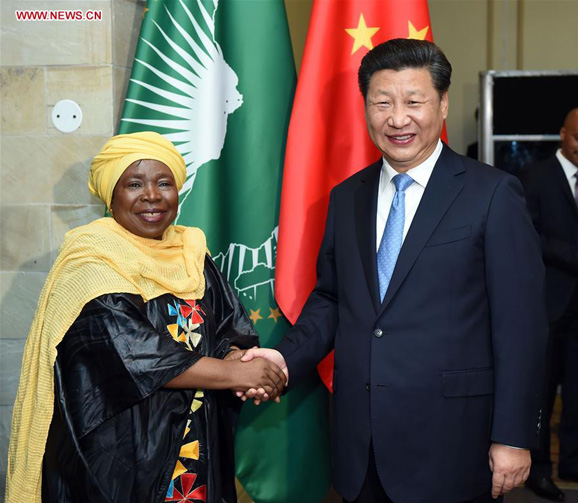The myth about Chinese imperialism in Africa
- By Heiko Khoo
 0 Comment(s)
0 Comment(s) Print
Print E-mail China.org.cn, December 5, 2015
E-mail China.org.cn, December 5, 2015
China's President Xi Jinping and leaders from all over Africa are attending the Forum on China-Africa Cooperation (FOCAC), which meets on Dec. 4-5 in South Africa. The objective is to intensify long-term strategic collaboration and mutual economic and technical development.
When the FOCAC was set up in 2000, total Sino-African trade stood at only $10bn – now it exceeds $220bn. China's investment stock in Africa is more than $30bn. Investment in infrastructure lies at the heart of China's engagement in Africa. This is laying the material foundations for lasting progress and modernization. For example, the construction of over 5,500km of railways and 4,500km of roads is being financed by China. In 2013 Chinese banks and enterprises funded a variety of infrastructure projects in Africa to the tune of $13.4bn mainly in power generation and railways. In addition, cooperation has flourished in healthcare, agriculture, conflict resolution, art and culture.
|
|
|
Chinese President Xi Jinping (R) meets with African Union Commission (AUC) Chairperson Nkosazana Dlamini-Zuma in Pretoria, South Africa, Dec. 3, 2015. [Xinhua] |
Although the United States and other Western powers remain the largest investors in Africa – China is now the continent's biggest trading partner. However, there is a widely accepted myth that Chinese companies secured their place in the African sun, by unfairly undercutting competition. In truth, private enterprises constitute the backbone of U.S., British and French investors, and they are simply unwilling to shoulder the risks associated with long-term infrastructure investment. Consequently, they lack the skills and capacity to develop the continent. This stands in sharp contrast with the methods employed by China's state-owned or state-controlled enterprises; and it exposes the short-term and exploitative nature of Western private investments.
The U.S. scholar Deborah Brautigam is one of the world's leading specialists on Sino-African relations. Her latest book "Will China Feed Africa" examines the emotive story that Africa is being conquered by Chinese agribusiness – supposedly in order to feed China. Few China stories are so prevalent or exaggerated by politicians, journalists and academics. She questions conventional wisdom about China's engagement with African agriculture.
The dominant Western narrative asserts that China is incorporating Africa into its global food security strategy. This involves accumulating vast tracts of African land to feed China – at the expense of the African people and continental development. Brautigam discovered that China is a net exporter of food to Africa, and Africa will not be feeding China any time soon.
To get to the truth, Brautigam analyzed 60 Chinese investments in Africa reported in the world's press. She also studied Chinese international economic investment policies and government incentive structures. By comparing these projects with reality, she found that most reports about the scale of Chinese investment were grossly exaggerated. And associated claims of Chinese "land-grabbing" were also found to be untrue.
When ZTE, a state-owned Chinese telecommunications company, invested in the Congo, some reports alleged that they were about to buy-up half of the country's arable land. ZTE did intend to invest in biofuels that would be grown on 2 million hectares of African land. However, when the company experts investigated the potential, they discovered that the only means of access to the land was by means of a river – whose complex navigation made the project totally unviable. As a consequence, only 200 hectares were eventually used – for an experiment – which was soon abandoned.
Surprisingly, China's investment in Australian agribusiness is larger than its combined agricultural investments in the African continent. Australia's main agricultural exports to China are sesame seed, cocoa and rubber.
The real focus of China's African agro-industry is investment in machine sales, and the establishment of experimental agricultural centers. In an interesting development, some local governments in Africa are contracting Chinese state enterprises to establish indigenous state-enterprises – and to help secure long-term food security.
The roots of the popular myths about Chinese-African relations lie in the Cold War. In fact China is not colonising Africa. And African governments are not the pliant stooges of Chinese "imperialism."
Heiko Khoo is a columnist with China.org.cn. For more information please visit:
http://china.org.cn/opinion/heikokhoo.htm
Opinion articles reflect the views of their authors, not necessarily those of China.org.cn.







Go to Forum >>0 Comment(s)